In the dynamic landscape of global commerce, heavy freight transport stands as a pivotal component driving economic growth and connectivity. At CarMax Trailer, we recognize the intricate demands of transporting substantial loads efficiently and safely. This comprehensive guide delves into the multifaceted world of heavy freight transport, exploring its significance, challenges, and the cutting-edge solutions that CarMax Vehicle offers to elevate your logistics operations.
The Critical Role of Heavy Freight Transport in Global Supply Chains
Heavy freight transport encompasses the movement of oversized, weighty goods that standard transportation methods cannot accommodate. These include machinery, construction materials, industrial equipment, and oversized commodities essential for various sectors. The seamless orchestration of heavy freight is vital for:
- Economic Advancement: Facilitates the distribution of critical materials and products across industries.
- Infrastructure Development: Supports construction projects by delivering essential building materials and machinery.
- Manufacturing Efficiency: Ensures timely availability of components necessary for production lines.
- Trade and Commerce: Enhances international trade by enabling the movement of bulk goods across borders.
Types of Heavy Freight: Navigating Diverse Transportation Needs
Understanding the types of heavy freight is paramount to selecting the appropriate transportation solutions. Heavy freight can be categorized into several distinct types:
| Type of Heavy Freight | Description |
|---|---|
| Over-Dimensional Loads | Items exceeding standard size and weight limits, requiring specialized handling. |
| Bulk Commodities | Large quantities of homogeneous materials like coal, grains, or ores. |
| Specialized Machinery | Industrial equipment and machinery needing precise transport conditions. |
| Project Cargo | Components of large-scale projects, often customized for specific needs. |
Each category presents unique challenges, necessitating tailored transport strategies to ensure efficiency and safety.

Advantages of Choosing CarMax Vehicle for Heavy Freight Transport
At CarMax Vehicle, we pride ourselves on delivering superior heavy freight transport solutions. Our commitment to excellence is reflected in the following advantages:
Advanced Semi-Trailer Technology
Our semi-trailers are engineered with state-of-the-art technology to handle the rigors of heavy freight transport. Features include:
- High Load Capacity: Robust construction supports substantial weights without compromising stability.
- Aerodynamic Design: Reduces drag, enhancing fuel efficiency and reducing transit times.
- Modular Configurations: Adaptable setups to accommodate various types of heavy freight.
Customized Solutions
We understand that each heavy freight project is unique. Our team collaborates closely with clients to develop bespoke transport plans, ensuring:
- Optimal Route Planning: Minimizes transit time and navigates regulatory constraints.
- Safety Protocols: Implements comprehensive safety measures to protect cargo and personnel.
- Flexible Scheduling: Aligns with clients’ timelines to meet tight delivery deadlines.
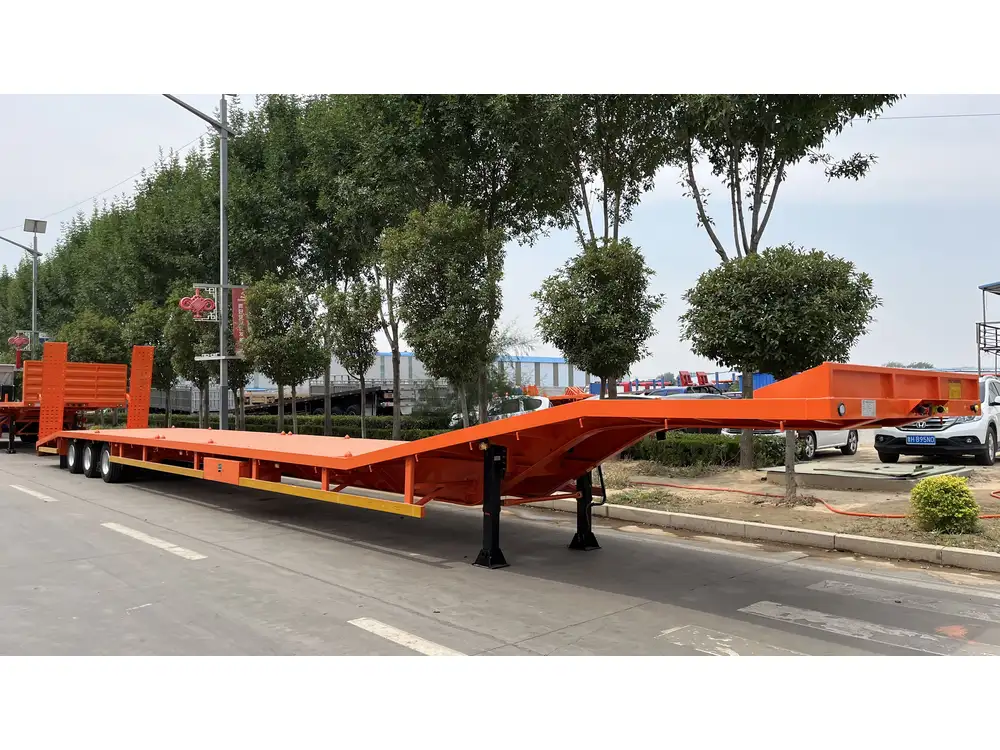
Reliability and Support
CarMax Vehicle is synonymous with reliability. Our support infrastructure includes:
- 24/7 Customer Service: Ready to address queries and provide assistance round-the-clock.
- Maintenance Services: Regular upkeep of trailers to ensure peak performance and minimize downtimes.
- Comprehensive Insurance: Protects against unforeseen incidents, providing peace of mind to our clients.
Innovations Transforming Heavy Freight Transport
The heavy freight transport sector is evolving rapidly, driven by technological advancements and shifting industry demands. Key innovations include:
Telematics and IoT Integration
The incorporation of telematics and Internet of Things (IoT) technologies enables real-time tracking and monitoring of freight. Benefits include:
- Enhanced Visibility: Provides stakeholders with up-to-date information on cargo location and status.
- Predictive Maintenance: Anticipates mechanical issues before they escalate, reducing operational disruptions.
- Data Analytics: Analyzes transport data to optimize routes and improve overall efficiency.
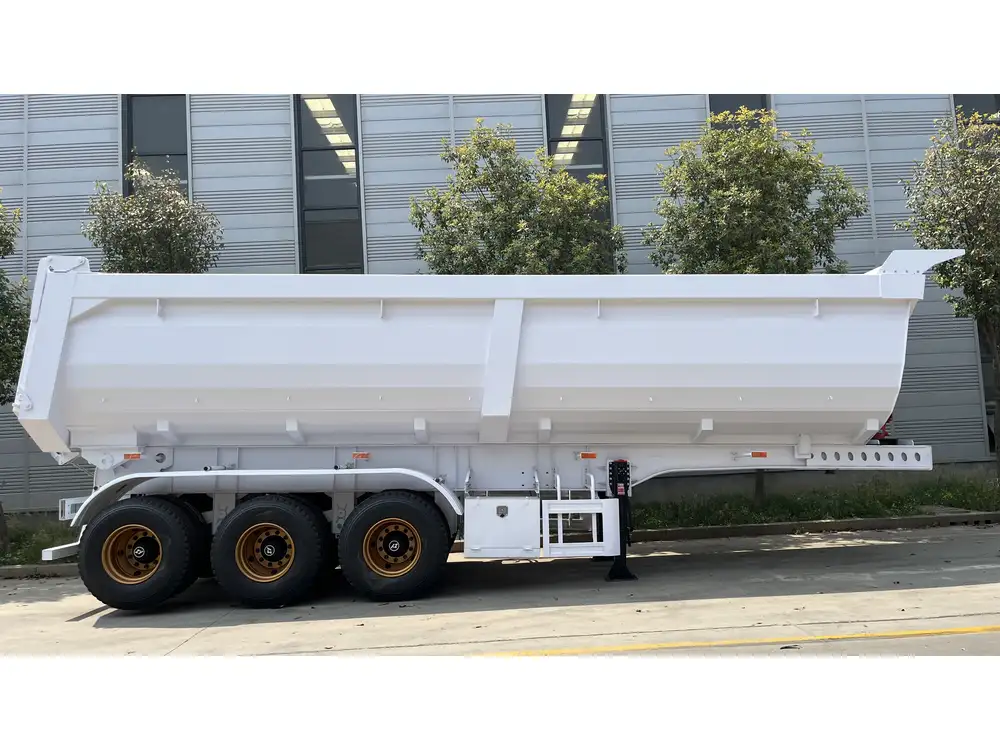
Automation and Autonomous Vehicles
Automation is reshaping heavy freight transport by introducing autonomous trailers that offer:
- Increased Efficiency: Reduces human error and optimizes driving patterns for fuel savings.
- Safety Enhancements: Minimizes accidents through advanced sensor and navigation systems.
- Operational Cost Reduction: Lowers labor costs and improves asset utilization.
Sustainable Transport Solutions
Environmental sustainability is a growing priority. Innovations promoting eco-friendly heavy freight transport include:
- Electric and Hybrid Trailers: Reduces carbon emissions and dependence on fossil fuels.
- Lightweight Materials: Enhances fuel efficiency by decreasing trailer weight without compromising strength.
- Emission Control Technologies: Implements advanced systems to minimize pollutant outputs during transport.
Selecting the Right Semi-Trailer for Heavy Freight
Choosing the appropriate semi-trailer is crucial for optimizing heavy freight transport. Consider the following factors:

Load Type and Weight
Different trailers are designed to handle specific types and weights of freight. Assess the nature of your cargo to determine:
- Flatbed Trailers: Ideal for over-dimensional and irregular loads.
- Lowboy Trailers: Suitable for exceptionally tall machinery and equipment.
- Step Deck Trailers: Provide a balance between height clearance and load capacity.
Trailer Specifications
Evaluate the technical specifications to ensure compatibility with your transport needs:
- Gross Vehicle Weight Rating (GVWR): Maximum allowable weight the trailer can carry.
- Axle Configuration: Number and placement of axles affect load distribution and road handling.
- Tie-Down Points: Adequate securing options to stabilize cargo during transit.
Regulatory Compliance
Ensure the selected trailer complies with regional and international transport regulations, addressing:
- Size and Weight Limits: Adheres to legal restrictions to avoid fines and transit delays.
- Safety Standards: Meets mandatory safety requirements for heavy freight transport.
- Permits and Licensing: Facilitates seamless cross-border movement without legal impediments.

Navigating Regulatory Landscapes in Heavy Freight Transport
The heavy freight transport industry operates within a complex regulatory framework designed to ensure safety, efficiency, and environmental stewardship. Key regulatory considerations include:
International Regulations
Transporting heavy freight across borders involves adherence to international standards such as:
- International Maritime Organization (IMO) Guidelines: For sea freight components.
- United Nations Economic Commission for Europe (UNECE) Standards: Harmonizes transport rules across member countries.
- Customs and Border Protection Laws: Facilitates lawful and efficient cargo clearance.
National and Regional Regulations
Compliance with local regulations is essential for domestic transport operations:
- Department of Transportation (DOT) Standards: Governs vehicle safety and driver qualifications in the United States.
- European Union (EU) Transport Directives: Standardizes transport policies among EU member states.
- Environmental Protection Agencies (EPA) Requirements: Regulates emissions and environmental impact.

Safety and Security Protocols
Implementing robust safety and security measures is paramount:
- Cargo Securing Practices: Prevents load shifting and accidents during transit.
- Driver Training Programs: Ensures personnel are equipped with the knowledge to handle heavy freight safely.
- Cargo Tracking Systems: Enhances security by providing real-time monitoring and theft prevention.
Embracing Sustainability in Heavy Freight Transport
Sustainability is increasingly integral to heavy freight transport, driven by environmental concerns and regulatory mandates. Strategies to enhance sustainability include:
Fuel Efficiency Improvements
Optimizing fuel consumption not only reduces operational costs but also minimizes environmental impact:
- Aerodynamic Trailer Designs: Decreases air resistance, leading to lower fuel usage.
- Engine Optimization: Enhances fuel efficiency through advanced engine technologies.
- Fuel-Efficient Driving Practices: Encourages behaviors that conserve fuel, such as optimal speed management and reduced idling.
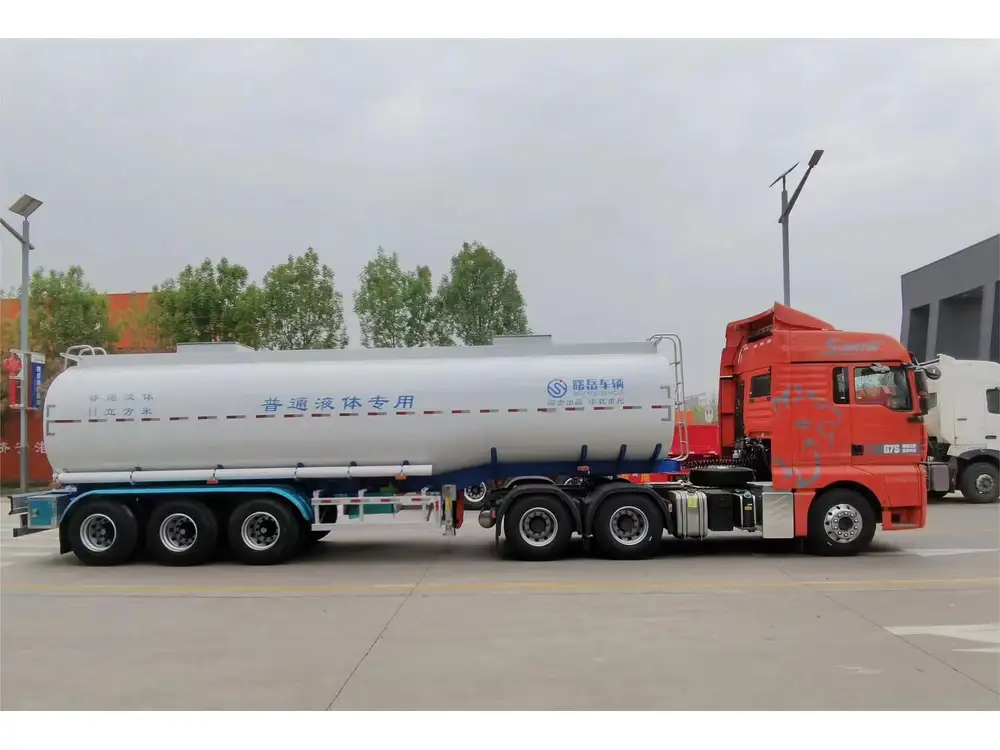
Alternative Energy Sources
Transitioning to alternative energy sources is pivotal for reducing carbon footprints:
- Electric Trailers: Powered by batteries, offering zero emissions during operation.
- Hybrid Systems: Combine traditional engines with electric power for improved efficiency.
- Hydrogen Fuel Cells: Provide a clean energy alternative with water as the primary byproduct.
Waste Reduction and Recycling
Implementing waste reduction and recycling initiatives contributes to environmental sustainability:
- Recycled Materials in Trailer Construction: Utilizes post-consumer materials to reduce waste.
- Efficient Resource Management: Minimizes material waste during manufacturing and transport processes.
- Recycling Programs: Encourages the reuse of trailer components at the end of their lifecycle.
Future Trends Shaping Heavy Freight Transport
The heavy freight transport sector is poised for transformative changes influenced by technological advancements and shifting market dynamics. Anticipated trends include:
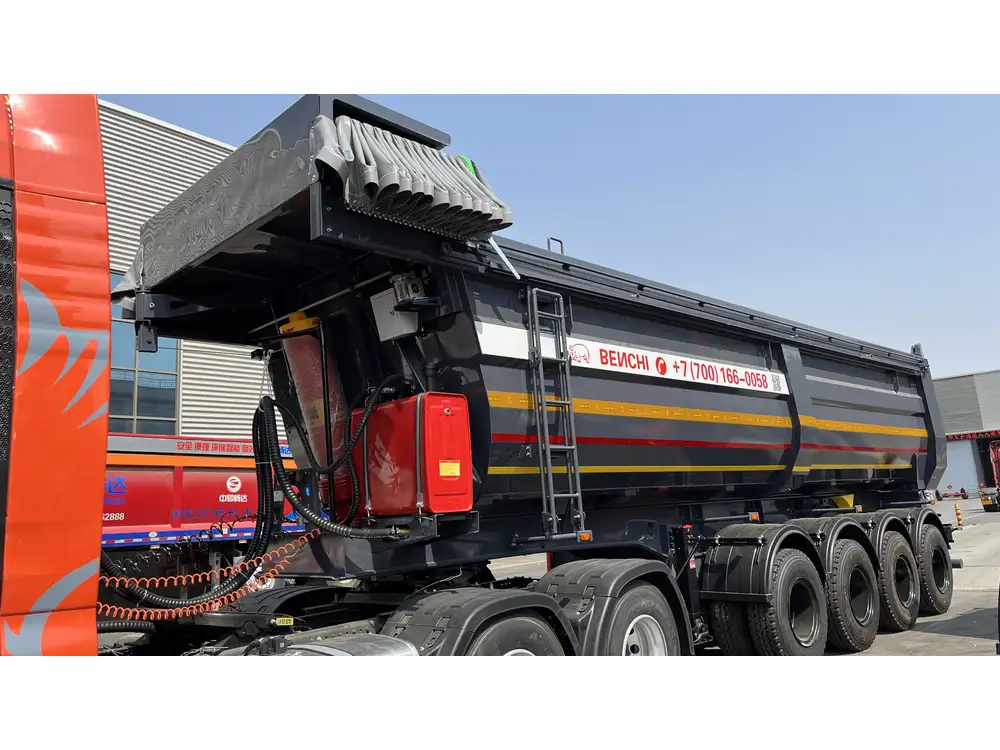
Autonomous Transport Systems
The rise of autonomous vehicles will revolutionize heavy freight transport by:
- Enhancing Operational Efficiency: Streamlining logistics through automated processes.
- Reducing Labor Costs: Minimizing the need for human drivers.
- Improving Safety: Utilizing advanced sensors and AI to prevent accidents.
Blockchain for Supply Chain Transparency
Blockchain technology offers unparalleled transparency and security in supply chain management:
- Immutable Transaction Records: Ensures data integrity and traceability.
- Smart Contracts: Automates contractual agreements, reducing delays and disputes.
- Enhanced Collaboration: Facilitates seamless information sharing among stakeholders.
Advanced Materials and Manufacturing Techniques
Innovations in materials science and manufacturing will drive improvements in trailer design:
- Lightweight Composites: Enhance fuel efficiency without sacrificing strength.
- Additive Manufacturing: Enables the production of complex components with reduced waste.
- Durable Coatings: Increase trailer longevity by protecting against environmental wear and tear.
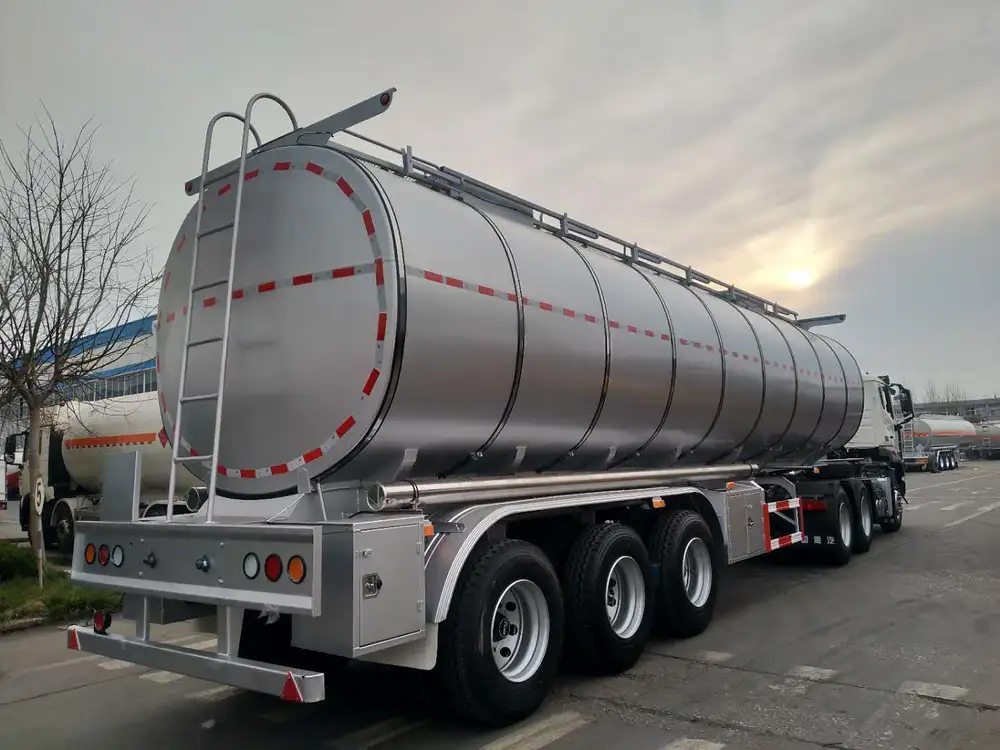
Integration of AI and Machine Learning
Artificial Intelligence (AI) and Machine Learning (ML) are set to optimize various aspects of heavy freight transport:
- Predictive Analytics: Forecasts maintenance needs and optimizes fleet management.
- Route Optimization: Analyzes traffic patterns and weather data to determine the most efficient routes.
- Demand Forecasting: Anticipates market trends to align transport capacities with demand.
CarMax Trailer: Pioneering Excellence in Heavy Freight Transport
At CarMax Vehicle, we are dedicated to leading the charge in heavy freight transport innovation. Our comprehensive range of semi-trailers, meticulous attention to detail, and unwavering commitment to customer satisfaction set us apart in the competitive logistics landscape. By leveraging advanced technologies, sustainable practices, and a customer-centric approach, we ensure that your heavy freight transport needs are met with unparalleled precision and reliability.
Frequently Asked Questions

1. What distinguishes CarMax Trailer from other heavy freight transport providers?
CarMax Trailer stands out through our relentless focus on innovation, customization, and customer support. Our trailers are built using cutting-edge technology, ensuring superior durability and efficiency. Additionally, we offer tailored transport solutions designed to meet the unique requirements of each client, backed by comprehensive support services.
2. How does CarMax Vehicle ensure the safety of heavy freight during transport?
Safety is paramount at CarMax Vehicle. We employ advanced securing mechanisms, conduct regular trailer inspections, and adhere to stringent safety protocols. Our drivers receive specialized training to handle heavy loads, and our trailers are equipped with state-of-the-art safety features to prevent accidents and cargo damage.
3. What sustainable practices does CarMax Trailer implement in heavy freight transport?
CarMax Trailer is committed to sustainability through the use of eco-friendly materials, fuel-efficient trailer designs, and the integration of alternative energy sources. We continuously seek to minimize our environmental impact by optimizing fuel consumption, reducing emissions, and promoting recycling and waste reduction throughout our operations.
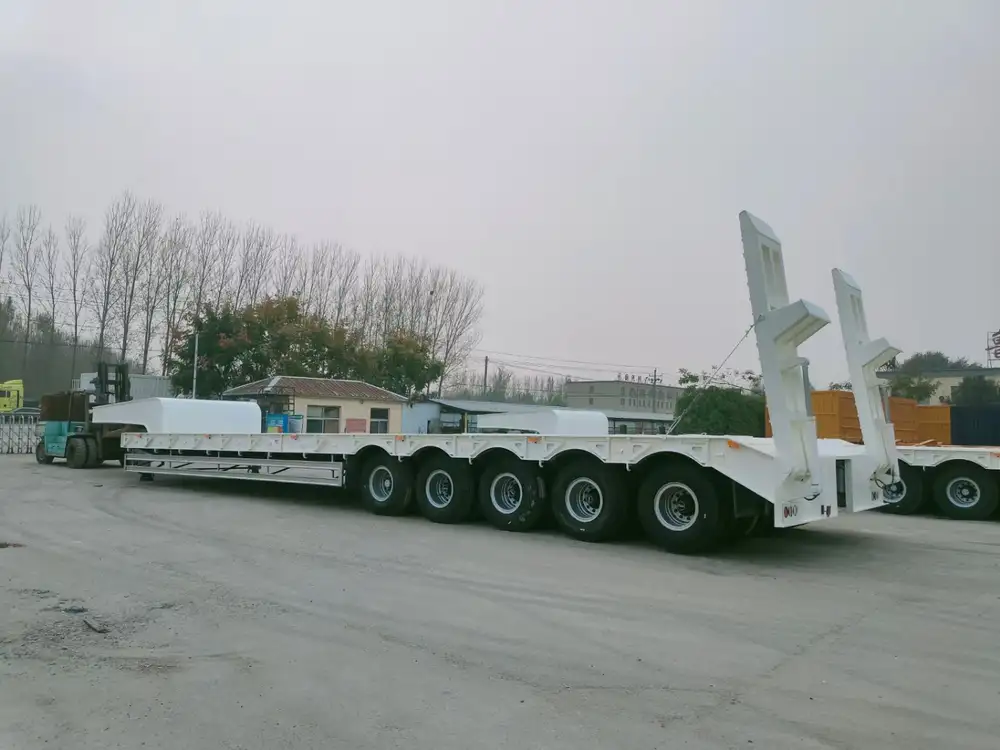
4. Can CarMax Vehicle accommodate custom transport requirements for oversized freight?
Absolutely. CarMax Vehicle excels in providing customized transport solutions for oversized and over-dimensional freight. Our modular trailer configurations and flexible logistics planning enable us to handle a wide range of heavy freight types, ensuring safe and efficient delivery tailored to your specific needs.
5. What technological advancements does CarMax Trailer incorporate to enhance freight transport efficiency?
We incorporate a myriad of technological advancements, including telematics for real-time tracking, IoT integration for cargo monitoring, and advanced aerodynamics to improve fuel efficiency. Additionally, our trailers are designed to support future innovations such as autonomous transport systems and AI-driven logistics optimization.



